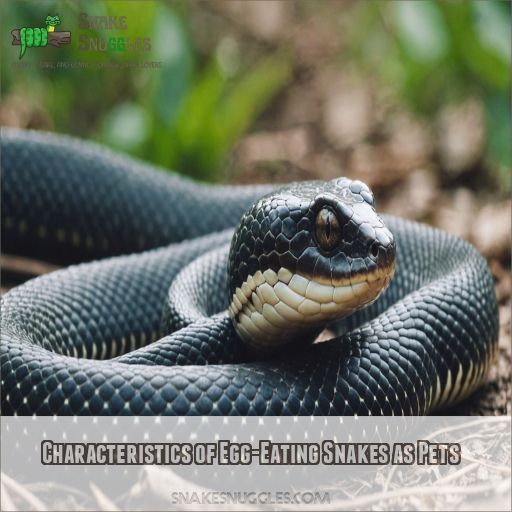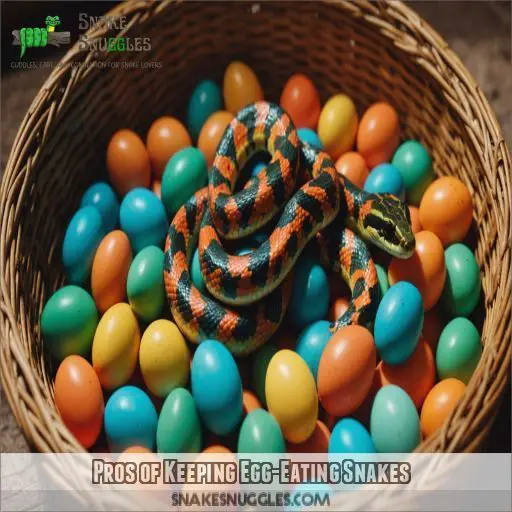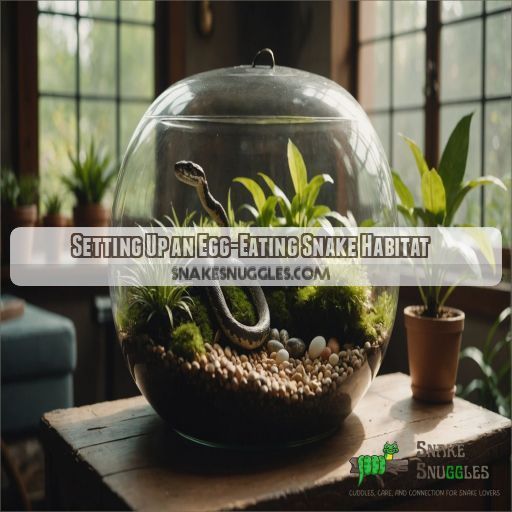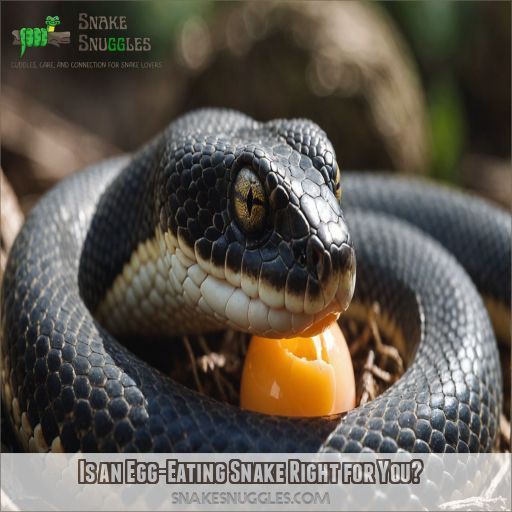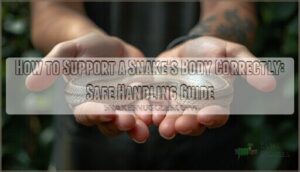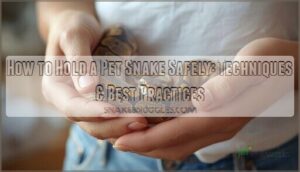This site is supported by our readers. We may earn a commission, at no cost to you, if you purchase through links.

Their one-track diet of eggs means you’ll always have a steady supply on hand. And they’re generally pretty chill, making handling a breeze. But don’t let their docile nature fool you – these snakes have some wild feeding behaviors that are a blast to watch.
The catch? Finding the right-sized eggs and maintaining their ideal habitat can be a challenge. Plus, some species are rare and pricey.
Table Of Contents
Key Takeaways
- Feeding egg-eating snakes is a breeze – just crack open the right-sized eggs! Their one-track diet means you’ll always have a steady supply on hand, though you may need to supplement with egg yolks.
- These docile reptiles make surprisingly chill pets. Handling is a stress-free breeze, and you can even build a bond with your slithery friend. Just be mindful of their personal space and body language.
- Egg-eating snakes are apartment-friendly, with their compact size and space-saving enclosures. However, don’t let their small stature fool you – they can live for over 20 years, so you’re in it for the long haul.
- While egg-eating snakes have low venom potency, you’ll still need to exercise caution. Proper first aid and medical care are essential, as allergic reactions or infections can occur. Stay vigilant, and you’ll have a safe and fascinating pet.
Characteristics of Egg-Eating Snakes as Pets
Egg-eating snakes are intriguing reptile pets with peculiar dietary needs—just imagine skipping rodent chow for quail eggs instead! While they generally stay small and easygoing, almost like the introverts of the snake world, their unique habits and variety of species make them fascinating companions.
Unique Dietary Requirements
Feeding egg-eating snakes isn’t your typical scrambled affair.
They devour eggs whole—quail, finch, and even small chicken, depending on their size.
Humorously, their digestion could teach us about portion control!
You’ll need a regular egg supply, considering their diet doesn’t vary.
Though low-maintenance in this aspect, supplements might be essential.
These quirky feeders will keep your curiosity sunny-side up!
Size and Lifespan
The size and lifespan of egg-eating snakes can vary widely depending on the species.
Most grow to a modest 3-5 feet in length and live 15-20 years with proper care.
Larger species like the African egg-eating snake can reach up to 6 feet and live over 25 years.
Understanding their growth rate and expected lifespan is important for providing the right long-term habitat and care.
Temperament and Handling
Egg-eating snakes have docile temperaments, making handling mostly stress-free. Here’s how to make sure both you and your snake are happy:
- Observe stress indicators like rapid tongue-flicking.
- Handle gently to minimize bite risks.
- Respect their space; social interactions aren’t their forte.
- Anticipate defensive behaviors by reading their body language.
Don’t worry, it’s easier than parallel parking!
Natural Habitat and Behavior
Handling egg-eating snakes feels like a walk in the park compared to their wild shenanigans!
Picture them in nature, practicing their unique prey preference: eggs.
They showcase intriguing burrowing behavior, ducking underground like seasoned hide-and-seek players to avoid predators.
Social butterflies? Not quite. These solitary critters prefer alone time, but understanding their egg-laying habits and predator avoidance makes for fascinating observation.
Species Varieties for Pet Keeping
If you’re considering egg-eating snakes as pets, explore popular breeds like the African Egg-Eating Snake.
Care differences exist, so familiarize yourself with availability and temperament variations.
Some species are rare, affecting costs.
Dig into legal considerations too, since regulations vary.
Choosing the right variety will make for a more harmonious experience with these fascinating creatures in your care.
Pros of Keeping Egg-Eating Snakes
Egg-eating snakes can make surprisingly good pets for the right owner. Their specialized diet and generally docile nature make them an intriguing choice, while their compact size suits small living spaces.
Specialized Diet Simplifies Feeding
Feeding your egg-eating snake is as simple as cracking an egg!
Because these snakes dine exclusively on eggs, there’s no need to fret about live prey.
With regular availability of the right-sized eggs, feeding frequency becomes straightforward.
Though they don’t need a varied diet, make sure their nutritional needs are met by occasionally providing egg yolk supplements.
Generally Docile Nature
The generally docile nature of egg-eating snakes makes them fascinating companions. Their temperament means:
- Handling is stress-free, ensuring you feel secure.
- Socialization is a breeze; they rarely exhibit defensive behavior.
- You’ll build a bond with minimal hissy fits!
Imagine your snake lounging around, stress-free—it’s like they’re practicing yoga! Their calm demeanor can be quite comforting.
Compact Size Suitable for Small Spaces
Egg-eating snakes are perfect little companions if you’re tight on space.
These apartment-friendly reptiles thrive in space-saving enclosures, making them ideal for small-space reptile care.
You won’t find them dictating room arrangements!
With a compact terrarium setup, you can easily maintain minimalist snake housing, fitting seamlessly into your lifestyle without overwhelming your living area.
Cozy and convenient, they’ve got your back!
Low Venom Risk
While egg-eating snakes generally have low venom potency, it’s still important to exercise caution. Their bites are typically mild, causing minimal swelling and discomfort. However, proper first aid and prompt medical attention are essential, as allergic reactions or secondary infections can occur. With the right precautions, these snakes make relatively safe pets for responsible owners.
- Venom potency is low, causing mild symptoms
- Antivenom is readily available for most species
- Bite severity is generally minimal, with swelling and pain
- First aid and medical care are still necessary
- Allergic reactions or infections are potential complications
Fascinating Feeding Behavior to Observe
Egg-eating snakes have an amazing feeding behavior! Watching them masterfully perform egg swallowing is like witnessing nature’s magic trick. They delicately hunt for eggs, then swallow them whole, leaving you agog. Surprisingly, they’ve specialized vertebrae to aid shell digestion. Talk about having a unique taste! Heres a quick egg-chew on their feeding habits:
| Aspect | Detail | Observation |
|---|---|---|
| Egg Swallowing | Whole | Mesmerizing |
| Shell Digestion | Specialized | Fascinating |
| Prey Selection | Eggs Only | Uncommon |
| Hunting Techniques | Stealth | Intriguing |
| Burrowing Behavior | Minimal | Simple Setup |
Challenges in Egg-Eating Snake Care
Despite their unique appeal, egg-eating snakes present some challenges for prospective pet owners. From finding the right eggs to maintaining their specific habitat needs, potential health issues, and legal restrictions, keeping these snakes as pets isn’t without its hurdles.
Sourcing Appropriate-Sized Eggs
While egg-eating snakes charm you with their feeding quirks, sourcing the right eggs can be a bit of a wild goose chase. Egg size variations matter, so check with local poultry farms or online egg sources. Beware, shell type impacts digestion! Once you’ve got them, egg storage tips keep your snake’s meals fresh as a daisy.
Maintaining Proper Temperature and Humidity
After finding the right-sized eggs, you’ve got to think about keeping your slithery friend comfy.
Egg-eating snakes are particular about their temperature and humidity.
Use heat mats and misting systems to keep things just right.
Proper humidity levels and good ventilation prevent your snake from feeling like it’s on a tropical vacation, so choose your substrate wisely to maintain balance!
Limited Availability and Higher Costs
Egg-eating snakes can be tricky to come by, as they’re not as widely bred as more common pet snakes. When you do find them, expect to pay a premium – these specialized feeders often cost much more than their rodent-eating counterparts. But with patience and an ethical breeder, you can find a healthy, happy hatchling to call your own.
Potential Health Issues Specific to Species
Egg-eating snakes, like all pets, face health challenges. Watch out for these issues:
- Egg-binding – stuck eggs can be a real sticking point.
- Parasites and respiratory infections – tiny hitchhikers you’d rather avoid.
- Calcium deficiency – no strong shell, no strong snake.
Legal Restrictions in Some Areas
Figuring out state laws around egg-eating snakes can feel like a legal maze, can’t it?
Make sure you’re up to speed on permit requirements and species regulations, as ignorance isn’t bliss here.
Some areas might restrict the snake trade due to ethical considerations.
Knowing the rules keeps you and your snake playing safe!
Setting Up an Egg-Eating Snake Habitat
Creating a cozy and comfortable habitat for your egg-eating snake can seem a bit overwhelming at first, but don’t worry – once you’ve figured it out, they’ll be as snug as a snake in a terrarium!
You’ll need to think about everything from terrarium size and temperature control to the ideal substrate, hiding spots, and humidity to keep your scaly friend happy and healthy.
Terrarium Size and Design
Designing the perfect egg-eating snake terrarium is really important.
You’ll want a spacious enclosure, around 36"x18"x18", to allow for natural behaviors.
Choose a substrate that retains humidity, like cypress mulch or sphagnum moss.
Provide multiple hides – one on the warm side, one on the cool side, and one in the middle.
Add a large water bowl and some branches or rocks for enrichment.
Essential Equipment for Temperature Control
Imagine your egg-eating snake needs a cozy habitat. Make sure it’s a comfy 82-88F with these essentials:
| Equipment | Purpose |
|---|---|
| Heating pads | Maintain base warmth |
| Thermostat | Regulate temperature precisely |
| Heat lamps | Provide basking areas |
| Thermometers | Monitor accuracy |
| Temperature gradient | Encourage exploration |
Substrate and Hiding Spots
You’ve nailed the temperature control, now let’s talk substrate and hiding spots—think of them as the carpet and cozy corners in your snake’s home. Pick a substrate that retains moisture for humidity control, like coconut fiber or moss. Add hiding spots for security, such as cork bark or reptile caves. Consider:
- Substrate Types: Choose moisture-retaining options.
- Hiding Spot Design: Offer varied shapes.
- Safety Considerations: Make sure there are no sharp edges.
Lighting and UVB Requirements
Setting up an egg-eating snake’s habitat feels like lighting just right—a dance choreographed by uvb bulb types. Stick with moderate UVB intensity, offering benefits like improved health. UVB duration depends on natural cycles, usually around 10-12 hours daily. Here’s a quick glance:
| Factor | Details |
|---|---|
| Bulb Types | Fluorescent, LEDs |
| Intensity | Moderate |
| Benefits | Bone health, activity |
| Duration | 10-12 hours daily |
| Alternatives | Sunbathing occasionally |
Getting the scale wrong? No worries; snakes won’t give you side-eye!
Water Sources and Humidity Maintenance
Providing your egg-eating snake with proper hydration is really important. Consider using a sturdy water bowl – one that’s heavy enough to avoid tipping, yet shallow enough for easy access. Aim for a humidity range of 50-60% and mist the enclosure 1-2 times daily to maintain ideal conditions. Choosing the right substrate can also help regulate moisture levels.
Is an Egg-Eating Snake Right for You?
Choosing to welcome an egg-eating snake into your home involves evaluating whether you’re ready to meet its unique care needs and quirky personality. Before you find yourself hunting down small bird eggs, consider your experience level and whether you’re up for this exotic adventure!
Assessing Your Experience Level
Before jumping in, consider your previous snake experience and reptile care knowledge. Are you comfortable handling them, or does it feel like wrestling with spaghetti? Egg-eating snakes have unique needs. Are you ready to research and commit to their care, even if life gives you lemons—not eggs? Your time availability plays a key role in succeeding.
Time and Financial Commitment
Caring for an egg-eating snake requires some financial foresight. The initial setup costs—terrarium, heating, and decor—can be a bit of a wallet pinch. Ongoing costs, luckily, are mostly just buying eggs, which isn’t exactly breaking the bank. Feeding time’s a breeze, but remember, you’re committing to their lifespan, ensuring space requirements are always met. Can you handle that?
Availability of Veterinary Care
Before welcoming an egg-eating snake into your home, carefully consider the availability of specialized veterinary care in your area. Look for:
- Exotic animal veterinarians with expertise in snake health and nutrition
- Emergency clinics equipped to handle reptile emergencies
- Reasonable costs for routine check-ups and any necessary treatments
Ensuring proper medical support is essential for the long-term wellbeing of your unique pet.
Long-Term Considerations for Pet Ownership
Thinking long-term, owning an egg-eating snake is like adopting a quirky roomie. You’ll need to accommodate their lifestyle changes, manage space requirements, and plan for vet costs. Consider their lifespan commitment—these snakes can live over a decade! What if your future plans change? They’re not a set-it-and-forget-it pet, so weigh your readiness carefully.
Alternatives to Egg-Eating Snakes
Consider exploring other snake species or lizard alternatives. Common pet reptiles like corn snakes provide a more straightforward experience with their diverse diets and care requirements. If snakes aren’t your bag, try invertebrate pets. Their unique traits might tickle your fancy. Remember, it’s all about fitting your lifestyle, ensuring both you and your possible pet enjoy a harmonious living arrangement.
Frequently Asked Questions (FAQs)
How do egg-eating snakes find eggs?
Egg-eating snakes have a nose for finding hidden treasure, literally! They slither around, using their keen sense of smell to detect eggs, often infiltrating bird nests with the precision of a secret agent on a mission.
Can egg-eating snakes recognize their owners?
Egg-eating snakes can’t recognize you like your dog would. Their brains aren’t wired for personal recognition; they see the world through smell and heat, focusing more on survival than complex social bonds (Source).
What precautions for handling egg-eating snakes?
When handling egg-eating snakes, always wear thick gloves to avoid bites. Move slowly and avoid sudden movements. Provide a secure enclosure to prevent escapes. With proper precautions, these fascinating snakes can make engaging pets for experienced reptile enthusiasts.
Are egg-eating snakes sensitive to loud noises?
Although specific studies on egg-eating snakes and loud noises are limited, snakes in general can hear and react to airborne sounds, especially in the lower frequency range below 600Hz, suggesting sensitivity to louder environments (Source).
How do egg-eating snakes maintain hydration?
Did you know that snakes are 70% water, just like us? Egg-eating snakes hydrate by absorbing moisture from their environment. Make sure their enclosure stays humid with a shallow water dish for sipping or soaking, keeping dehydration at bay!
Conclusion
Did you know that over 80% of egg-eating snakes have a peaceful demeanor, making them appealing pets?
If you’re considering whether egg-eating snakes are good pets for you, weigh the pros and cons.
They can be low-maintenance in feeding but do require effort in creating a suitable living environment.
With their intriguing eating habits, they promise entertainment, but sourcing eggs and ensuring habitat needs could be challenging.
Ultimately, their specialized care might reward dedicated enthusiasts.

